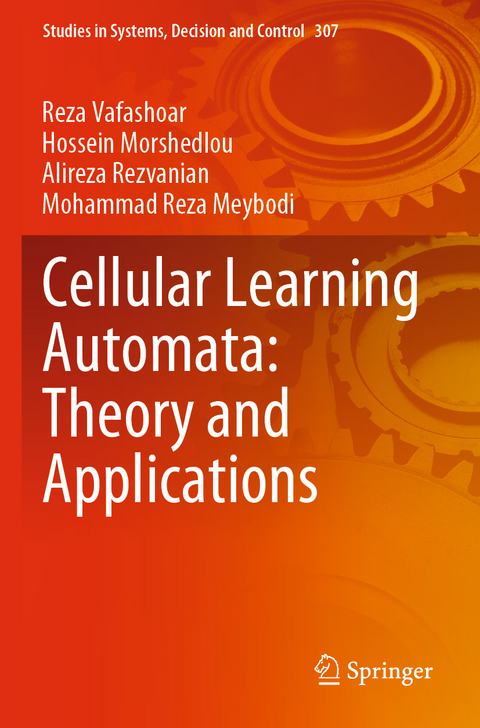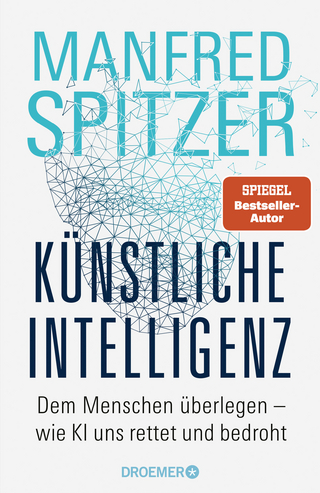
Cellular Learning Automata: Theory and Applications
Springer International Publishing (Verlag)
978-3-030-53143-0 (ISBN)
The book begins with a brief introduction to various CLA models, before focusing on recently developed CLA variants. In turn, the research areas related to CLA are addressed as bibliometric network analysis perspectives. The next part of the book presents CLA-based solutions to several computer science problems in e.g. static optimization, dynamic optimization, wireless networks, mesh networks, and cloud computing. Given its scope, the book is well suited for all researchers in the fields of artificial intelligence and reinforcement learning.
Reza Vafashoar received the B.S. degree in Computer Engineering from Urmia University, Urmia, Iran, in 2007, and the M.S. degree in Artificial Intelligence from Amirkabir University of Technology, Tehran,Iran, in 2010. He also received the Ph.D. degree in Computer Engineering at the Computer Engineering Department from Amirkabir University of Technology (Tehran Polytechnic), Tehran, Iran, in 2019. His research interests include learning systems, cellular learning automata, evolutionary computing, and other computational intelligence techniques.
Hossein Morshedlou received the B.Sc. degree in computer engineering from Ferdowsi University,Mashhad, Iran, and the M.Sc. degree in computer engineering from the Amirkabir University of Technology, Tehran, Iran, in 2005 and 2008,respectively. He also received the Ph.D. degree in Computer Engineering at the Computer Engineering Department from Amirkabir University of Technology (Tehran Polytechnic), Tehran, Iran, in 2017. Since 2019, he has been an assistant professor with the Faculty of Computer Engineering and Information Technology, Shahrood University of Technology, Shahrood, Iran. His research interests include distributed systems, cloud computing, learning automata, reinforcement learning, parallel algorithms, and soft computing.
Alireza Rezvanian received the B.Sc. degree from Bu-Ali Sina University of Hamedan, Iran, in 2007, the M.Sc. degree in Computer Engineering with honors from Islamic Azad University of Qazvin, Iran, in 2010, and the Ph.D. degree in Computer Engineering at the Computer Engineering Department from Amirkabir University of Technology (Tehran Polytechnic), Tehran, Iran, in 2016. Currently, he is an Assistant Professor with the Department of Computer Engineering, University of Science and Culture, Tehran, Iran. He worked from 2016 to 2020 as a researcher at the School of Computer Science from the Institute for Research in Fundamental Sciences (IPM), Tehran, Iran. He has authored or co-authored more than 70 research publications in reputable peer-reviewed journals and conferences including IEEE, Elsevier, Springer, Wiley and Taylor & Francis. He has been a guest editor of the special issue on new applications of learning automata-based techniques in real-world environments for the journal of computational science (Elsevier). He is an associate editor of both human-centric computing and information sciences (Springer) and CAAI Transactions on Intelligence Technology (IET). His research activities include soft computing,learning automata, complex networks, social network analysis, data mining, data science, machine learning, and evolutionary algorithms.
Mohammad Reza Meybodi received the B.S. and M.S. degrees in Economics from the Shahid Beheshti University in Iran, in 1973 and 1977, respectively. He also received the M.S. and Ph.D. degrees from Oklahoma University, USA, in 1980 and 1983, respectively, in Computer Science. Currently, he is a Full Professor in the Computer Engineering Department, Amirkabir University of Technology, Tehran, Iran. Prior to the current position, he worked from 1983 to 1985 as an Assistant Professor at the Western Michigan University and from 1985 to 1991 as an Associate Professor at Ohio University, USA. His current research interests include learning systems, cloud computing, soft computing, and social networks.
Varieties of Cellular Learning Automata: An overview.- Cellular learning automata: A bibliometric analysis.- Learning from multiple reinforcements in cellular learning automata.- Applications of cellular learning automata and reinforcement learning in global optimization.- Applications of multi-reinforcement cellular learning automata in channel assignment.- Cellular Learning Automata for Collaborative Loss Sharing.- Cellular Learning Automata for Competitive Loss Sharing.- Cellular Learning Automata versus Multi-Agent Reinforcement Learning.
| Erscheinungsdatum | 27.07.2021 |
|---|---|
| Reihe/Serie | Studies in Systems, Decision and Control |
| Zusatzinfo | XVI, 365 p. 177 illus., 174 illus. in color. |
| Verlagsort | Cham |
| Sprache | englisch |
| Maße | 155 x 235 mm |
| Gewicht | 587 g |
| Themenwelt | Informatik ► Theorie / Studium ► Künstliche Intelligenz / Robotik |
| Technik | |
| Schlagworte | Asynchronous Cellular Learning Automata • Cellular Learning Automata • Discretized Learning Automata • Distributed Learning Automata • Dynamic Cellular Learning Automata • Estimator Learning Automata • Games of Learning Automata • Interconnected Learning Automata • Irregular Cellular Learning Automata • learning automata • Network of Learning Automata • Reinforcement Learning • Reinforcement Learning • Wavefront Cellular Learning Automata |
| ISBN-10 | 3-030-53143-0 / 3030531430 |
| ISBN-13 | 978-3-030-53143-0 / 9783030531430 |
| Zustand | Neuware |
| Haben Sie eine Frage zum Produkt? |
aus dem Bereich


